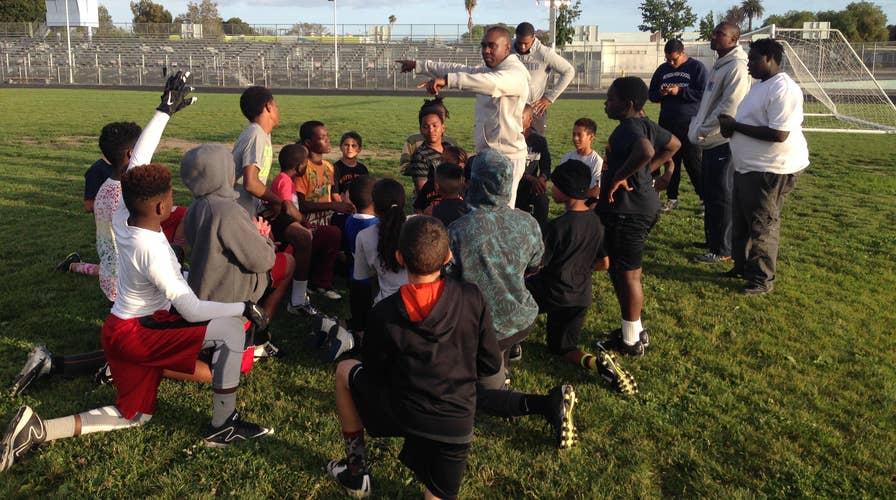Police bridge gap with community using football program
Will Carr reports on mentoring efforts in the Watts neighborhood of Los Angeles
In the middle of Watts, a neighborhood in South Los Angeles that is still emotionally scarred from brutal anti-police riots in the 1960s, a group of kids and coaches have come together for football practice.
The team steps onto the only green field seen for miles. It’s pocked with dead grass and dirt, but the players don’t seem to mind. They run, laugh and compete.
The Watts Bears aren’t just preparing for their next opponent. Every snap, pass and touchdown is trying to fortify the lack of trust between the community and members of law enforcement.
“To try to change that and change the community you have to get your hands dirty and working with kids who are 9 to 12 so that when they're 15, 16, 17, 18 that relationship that they have with law enforcement is completely different,” Officer James Holliman, a Watts Bears’ coach, says.
The goal is to keep the kids on the field and off the streets. So the team’s four coaches, all Los Angeles Police Department officers who patrol Watts during the day, have made it their mission to mentor every player.
“Rather than just arresting and moving on to the next problem, we're preventing a problem before it even starts,” Officer Greg Goosby says. “Some of the kids don't have father figures at home so we've become that, so we're another voice or ear to listen to them.”
For many of the players, the police officers have become family.
“They're like another dad; they're like more parents for us. They give us good advice,” Jahiem "Big J" Gillett says.
Gillett says he can call the coaches any time and he knows they’ll pick up the phone.
Gillett’s friend and teammate, Quan'nell "Duda" McKissic, shares the same faith in his coaches, although he admits he didn’t always trust law enforcement.
“I didn't like the police, I didn't want to have nothing to do with them,” McKissic said, explaining his mindset before he joined the Bears.
“My coaches fixed my life because before I started playing for them I was basically on the wrong track just doing bad stuff and now it's just getting my grades better and being more respectful to my mom,” McKissic says. “All cops are not bad and you should just respect the police and they'll give you respect back.”
And it's working. The three housing developments involved in the Community Safety Partnership Program, which sponsors the Bears, have seen a 50 percent reduction in homicides since the football team hit the field in 2011. This year, violent crime is up across Los Angeles but has dropped in Watts.
In fact, the program is so successful it has branched out. Officers are now filling in at father/daughter dances, tutoring and even going to parent-teacher conferences.
“The fact is they really look up to their coaches and they want to be like them when they get older,” Kenya Brooks, whose son plays on the team, says.
As community and police tensions simmer across the country, both the officers and parents believe if a program like the Bears can work in Watts, it can work anywhere in the United States.
“Football is the carrot, but we're really using that to mentor and be a focal point in these kids’ lives where we're helping them do better things in their lives,” Officer Holliman says.


